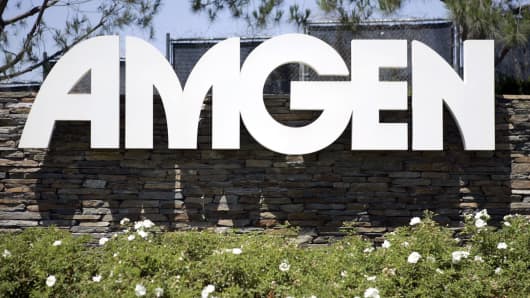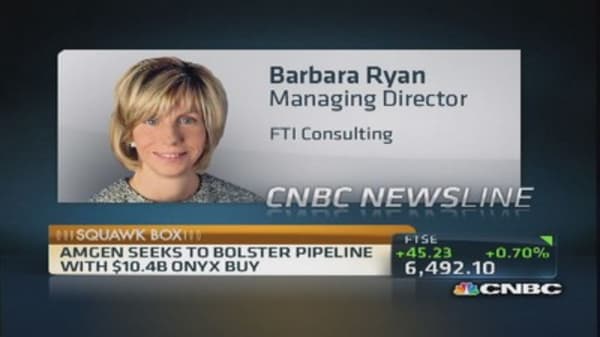"The drug has obviously just been launched. And the expectation is that it will have other indications down the road," Barbara Ryan, managing director at FTI Consulting, told CNBC Monday. "This is expected to be a large market over time."
The world's largest biotechnology company will also gain a revenue stream from the liver and kidney cancer drug Nexavar that Onyx shares with Bayer AG, as well as royalty payments on Bayer's much newer colon cancer drug, Stivarga, and potential future royalties on an experimental breast cancer drug being developed by Pfizer.
Calif.-based Amgen has faced growing pressure to beef up its drug development pipeline as safety concerns have trimmed sales of its flagship anemia drugs, Aranesp and Epogen. Also, patents on four of its five top-selling drugs are set to expire starting in 2015.
Cancer medicines are the holy grail for many drugmakers because current products have limited effectiveness and the companies can charge steep prices for new biotech treatments.
Amgen said Sunday it will pay $125 per share for Onyx, also based on Calif., a 4.2 percent increase from the $120 a share it offered in June. Onyx said that bid significantly undervalued the company and put itself up for sale.
The companies expect the deal to close in the beginning of the fourth quarter. Amgen expects it to add to adjusted net income in 2015.
Onyx shares closed at $116.96 on Friday. They closed at $85.50 on June 28, before reports of Amgen's $120-a-share bid surfaced.
Biggest Deal Since 2001
The Onyx deal is Amgen's biggest since its $16 billion acquisition of Immunex in 2001 which gave it the rheumatoid arthritis drug Enbrel, now one of Amgen's biggest-selling products.
It is also by far the biggest deal under CEO Bob Bradway, who assumed the top spot in May 2012. He has done a handful of much smaller deals, the biggest to date being a $1.16 billion acquisition of Micromet.
Large pharmaceutical companies have increasingly been looking to acquire smaller biotech firms to gain access to new drugs, as they face significant revenue losses stemming from expired patents.
This helped drive up the volume of healthcare M&A in the first six months of 2013 more than 30 percent compared with the same period last year.
Recent deals include generic drugmaker Actavis' $8.5 billion acquisition of Warner Chilcott and Human Genome Sciences' $3 billion sale to GlaxoSmithKline Plc.
The Onyx deal is expected to give Amgen a much higher profile in oncology. Amgen's cancer portfolio includes Neupogen and Neulasta—which help patients deal with the side-effects from chemotherapy.
"Amgen is much like a large pharma company," FTI's Ryan said in the CNBC "Squawk Box" interview. "A lot of its products are maturing and will face competition from bio-similars. It's looking to complement its portfolio."
Analysts expected Onyx revenue to reach $878 million in 2014, according to Thomson Reuters.
Mark Schoenebaum, an analyst with ISI Group, projected that an Onyx acquisition would increase Amgen non-GAAP earnings by 5 percent in 2015, and boost them as much as 15 to 20 percent in 2018.
—By Reuters. CNBC's Matthew J. Belvedere contributed to this article. Follow him on Twitter @Matt_SquawkCNBC.




